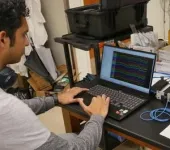(Press-News.org) DURHAM, NC -- A speech prosthetic developed by a collaborative team of Duke neuroscientists, neurosurgeons, and engineers can translate a person’s brain signals into what they’re trying to say.
Appearing Nov. 6 in the journal Nature Communications, the new technology might one day help people unable to talk due to neurological disorders regain the ability to communicate through a brain-computer interface.
“There are many patients who suffer from debilitating motor disorders, like ALS (amyotrophic lateral sclerosis) or locked-in syndrome, that can impair their ability to speak,” said Gregory Cogan, Ph.D., a professor of neurology at Duke University’s School of Medicine and one of the lead researchers involved in the project. “But the current tools available to allow them to communicate are generally very slow and cumbersome.”
Imagine listening to an audiobook at half-speed. That’s the best speech decoding rate currently available, which clocks in at about 78 words per minute. People, however, speak around 150 words per minute.
The lag between spoken and decoded speech rates is partially due the relatively few brain activity sensors that can be fused onto a paper-thin piece of material that lays atop the surface of the brain. Fewer sensors provide less decipherable information to decode.
To improve on past limitations, Cogan teamed up with fellow Duke Institute for Brain Sciences faculty member Jonathan Viventi, Ph.D., whose biomedical engineering lab specializes in making high-density, ultra-thin, and flexible brain sensors.
For this project, Viventi and his team packed an impressive 256 microscopic brain sensors onto a postage stamp-sized piece of flexible, medical-grade plastic. Neurons just a grain of sand apart can have wildly different activity patterns when coordinating speech, so it’s necessary to distinguish signals from neighboring brain cells to help make accurate predictions about intended speech.
After fabricating the new implant, Cogan and Viventi teamed up with several Duke University Hospital neurosurgeons, including Derek Southwell, M.D., Ph.D., Nandan Lad, M.D., Ph.D., and Allan Friedman, M.D., who helped recruit four patients to test the implants. The experiment required the researchers to place the device temporarily in patients who were undergoing brain surgery for some other condition, such as treating Parkinson’s disease or having a tumor removed. Time was limited for Cogan and his team to test drive their device in the OR.
“I like to compare it to a NASCAR pit crew,” Cogan said. “We don't want to add any extra time to the operating procedure, so we had to be in and out within 15 minutes. As soon as the surgeon and the medical team said ‘Go!’ we rushed into action and the patient performed the task.”
The task was a simple listen-and-repeat activity. Participants heard a series of nonsense words, like “ava,” “kug,” or “vip,” and then spoke each one aloud. The device recorded activity from each patient’s speech motor cortex as it coordinated nearly 100 muscles that move the lips, tongue, jaw, and larynx.
Afterwards, Suseendrakumar Duraivel, the first author of the new report and a biomedical engineering graduate student at Duke, took the neural and speech data from the surgery suite and fed it into a machine learning algorithm to see how accurately it could predict what sound was being made, based only on the brain activity recordings.
For some sounds and participants, like /g/ in the word “gak,” the decoder got it right 84% of the time when it was the first sound in a string of three that made up a given nonsense word.
Accuracy dropped, though, as the decoder parsed out sounds in the middle or at the end of a nonsense word. It also struggled if two sounds were similar, like /p/ and /b/.
Overall, the decoder was accurate 40% of the time. That may seem like a humble test score, but it was quite impressive given that similar brain-to-speech technical feats require hours or days-worth of data to draw from. The speech decoding algorithm Duraivel used, however, was working with only 90 seconds of spoken data from the 15-minute test.
Duraivel and his mentors are excited about making a cordless version of the device with a recent $2.4M grant from the National Institutes of Health.
“We're now developing the same kind of recording devices, but without any wires,” Cogan said. “You'd be able to move around, and you wouldn't have to be tied to an electrical outlet, which is really exciting.”
While their work is encouraging, there’s still a long way to go for Viventi and Cogan’s speech prosthetic to hit the shelves anytime soon.
“We're at the point where it's still much slower than natural speech,” Viventi said in a recent Duke Magazine piece about the technology, “but you can see the trajectory where you might be able to get there.”
This work was supported by grants from the National Institutes for Health (R01DC019498, UL1TR002553), Department of Defense (W81XWH-21-0538), Klingenstein-Simons Foundation, and an Incubator Award from the Duke Institute for Brain Sciences.
CITATION: “High-resolution Neural Recordings Improve the Accuracy of Speech Decoding,” Suseendrakumar Duraivel, Shervin Rahimpour, Chia-Han Chiang, Michael Trumpis, Charles Wang, Katrina Barth, Stephen C. Harward, Shivanand P. Lad, Allan H. Friedman, Derek G. Southwell, Saurabh R. Sinha, Jonathan Viventi, Gregory B. Cogan. Nature Communications, November 06 2023. DOI: 10.1038/s41467-023-42555-1
END
Brain implant may enable communication from thoughts alone
Prosthetic decodes signals from brain’s speech center to predict what sound someone is trying to say
2023-11-06
ELSE PRESS RELEASES FROM THIS DATE:
Genetic architecture may be key to using peacekeeping immune cells to treat autoimmunity or fight cancer
2023-11-06
LA JOLLA (November 6, 2023)—Regulatory T cells are specialized immune cells that suppress the immune response and prevent the body from attacking its own cells. Understanding how these cells work is key to determining how they might be manipulated to encourage the destruction of cancer cells or prevent autoimmunity. Cell behavior is influenced by chromatin architecture (the 3D shape of chromosomes) and which genes are accessible to proteins—like Foxp3, which promotes regulatory T cell development.
Now, Salk Professor Ye Zheng and Assistant Professor Jesse ...
Women stroke survivors believe they will receive worse care in the emergency room
2023-11-06
Women who have survived a stroke believe they are less likely to receive adequate emergency care – based on gender and race or ethnicity, a study led by Michigan Medicine and Brown University finds.
Researchers analyzed survey data from the American Heart Association Research Goes Red Registry to determine perceptions of emergency care for women with and without a history of stroke.
Results published in Stroke reveal that women with a history of stroke were over three times more likely to believe “to a great extent” that they would not receive adequate care in the emergency room based on their gender and race or ethnicity.
“It’s clear from our findings ...
Artificial intelligence may help predict – possibly prevent – sudden cardiac death
2023-11-06
Research Highlights:
Predicting sudden cardiac death may be possible using artificial intelligence (AI) to analyze medical information in electronic health records, according to preliminary research conducted by researchers in France.
Researchers analyzed electronic health records from 25,000 people who had died suddenly and 70,000 people hospitalized for cardiac arrest who did not die in Paris, France and Seattle, Washington and used AI to build personalized health equations that identified each person’s risk of dying from sudden cardiac arrest.
Additionally, the researchers were able to develop a customized risk profile of each ...
Cognitive Behavioral Therapy beneficial for patients with ME/CFS
2023-11-06
Researchers from Amsterdam UMC and King's College London have shown that Cognitive Behavioural Therapy (CBT) is beneficial for those with ME/CFS. They analysed data from trials involving almost 1300 patients and found that CBT led to a reduction in fatigue and physical limitations. These results are published today in Psychological Medicine.
“We found CBT led to a clinically relevant reduction in fatigue and functional impairment as well as an increase in physical functioning. These results give a clear picture that CBT can be beneficial for a substantial number of patients. About ...
Plants' ingenious defence against mutational damage
2023-11-06
Humans wouldn’t last long without plant mitochondria and chloroplasts. These essential compartments of plant cells famously capture sunlight and power plant life – and so, ultimately, provide all the food we eat.But there’s a problem: Mitochondria and chloroplasts store instructions for their building blocks in their own ”organelle” DNA or oDNA – and this can get mutated.
You can see mild effects of this in some “variegated” plants – where leaves get bleached and lose the ability to photosynthesise (see ...
Landmark study reveals critical shortage in UK prosthetic and orthotic workforce
2023-11-06
A Staffordshire University study has revealed a significant deficit in the number of prosthetists, orthotists, prosthetic and orthotic technicians, and support workers in the UK.
The report by the Centre for Biomechanics and Rehabilitation Technologies (CBRT) is formally launched today, 6 November 2023.
This research, commissioned by the British Association of Prosthetists and Orthotists (BAPO), found there are currently 631 orthotists and 295 prosthetists employed nationwide. However, an additional 142 to 477 prosthetists/orthotists are needed to meet World Health Organization standards of care.
"This workforce shortage is worrying," said Professor Nachi ...
At the same PSA level, Black men are more likely to have prostate cancer than white men
2023-11-06
Black men in the United States are more likely to develop prostate cancer than white men, and after diagnosis, they’re more likely to have advanced disease and to die than white men with the disease. Although it would seem that earlier prostate‐specific antigen (PSA) screening could reduce the risk of fatal prostate cancer in Black men, new research indicates that at any given PSA level, Black men are more likely to harbor prostate cancer than white men, indicating that they may face an increased risk of prostate cancer than white men at lower PSA levels. The findings are published by Wiley online in CANCER, ...
Want the secret to less painful belly flops? These researchers have the answer.
2023-11-06
PROVIDENCE, R.I. [Brown University] — Anyone who’s ever done a belly flop into a swimming pool knows it ends with a blunt-sounding splat, a big splash and a searing red sting. What most people don’t know is why.
Daniel Harris does. The assistant professor in Brown University’s School of Engineering says the physics behind the phenomenon aren’t too complex. What happens — and what makes it so painful, he explains — is that the forces from the water surface put up a fierce resistance to the body suddenly going from air to water, which is often still.
“All of a sudden, ...
Video technology could transform how scientists monitor changes in species evolution and development
2023-11-06
Scientists have made a major breakthrough in the study of species evolution, and provided further evidence that state-of-the-art visual technology can be used to track the tiniest changes in different organisms’ development.
New research used a combination of robotic video microscopes and computer vision to measure all of the observable characteristics of embryos of three different species.
These measurements were recorded as spectra of energy and, through this, scientists were able to compare shifts between species alongside previously documented differences in the timing of discrete developmental ...
KERI developed an alternative technology for ‘SF6’, the main culprit of global warming
2023-11-06
Korea Electrotechnology Research Institute (KERI) has developed a world-class 'eco-friendly insulating gas' that replaces SF6 (sulfur hexafluoride), the main cause of global warming in the field of electric power equipment, and developed a design technology to make it applicable to ultra-high voltage transmission circuit breakers.
Of course, power devices must be able to conduct electricity well but an ‘insulation’ function to block electricity is also essential to prepare for unexpected accidents and for safety reasons. SF6 gas offers excellent insulation and with far superior arc extinguishing performance than any other ...
LAST 30 PRESS RELEASES:
$3 million NIH grant funds national study of Medicare Advantage’s benefit expansion into social supports
Amplified Sciences achieves CAP accreditation for cutting-edge diagnostic lab
Fred Hutch announces 12 recipients of the annual Harold M. Weintraub Graduate Student Award
Native forest litter helps rebuild soil life in post-mining landscapes
Mountain soils in arid regions may emit more greenhouse gas as climate shifts, new study finds
Pairing biochar with other soil amendments could unlock stronger gains in soil health
Why do we get a skip in our step when we’re happy? Thank dopamine
UC Irvine scientists uncover cellular mechanism behind muscle repair
Platform to map living brain noninvasively takes next big step
Stress-testing the Cascadia Subduction Zone reveals variability that could impact how earthquakes spread
We may be underestimating the true carbon cost of northern wildfires
Blood test predicts which bladder cancer patients may safely skip surgery
Kennesaw State's Vijay Anand honored as National Academy of Inventors Senior Member
Recovery from whaling reveals the role of age in Humpback reproduction
Can the canny tick help prevent disease like MS and cancer?
Newcomer children show lower rates of emergency department use for non‑urgent conditions, study finds
Cognitive and neuropsychiatric function in former American football players
From trash to climate tech: rubber gloves find new life as carbon capturers materials
A step towards needed treatments for hantaviruses in new molecular map
Boys are more motivated, while girls are more compassionate?
Study identifies opposing roles for IL6 and IL6R in long-term mortality
AI accurately spots medical disorder from privacy-conscious hand images
Transient Pauli blocking for broadband ultrafast optical switching
Political polarization can spur CO2 emissions, stymie climate action
Researchers develop new strategy for improving inverted perovskite solar cells
Yes! The role of YAP and CTGF as potential therapeutic targets for preventing severe liver disease
Pancreatic cancer may begin hiding from the immune system earlier than we thought
Robotic wing inspired by nature delivers leap in underwater stability
A clinical reveals that aniridia causes a progressive loss of corneal sensitivity
Fossil amber reveals the secret lives of Cretaceous ants
[Press-News.org] Brain implant may enable communication from thoughts aloneProsthetic decodes signals from brain’s speech center to predict what sound someone is trying to say







